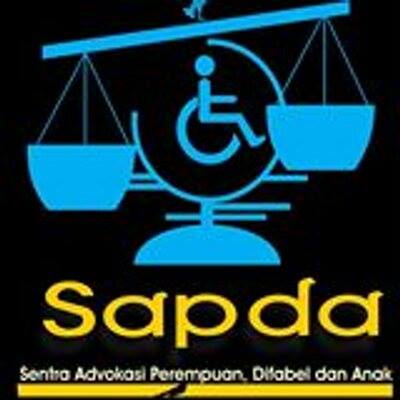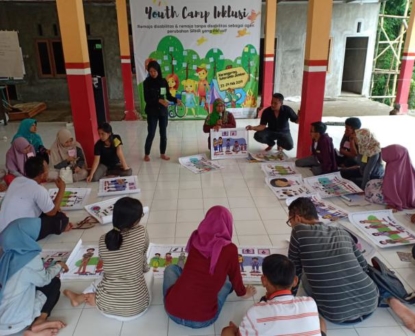Project
Strengthening Youth Access to SRHR Services
-
Amount Funded
24,970 EUROProject Duration
01 Sep 2018 - 31 Aug 2019 -
-
Lead organisation
-
Sentra Advokasi Perempuan Difabel dan Anak (SAPDA) is a non-governmental organisation with the vision to realise changes for the fulfilment and protection of the rights of women, persons with disabilities and children in an inclusive society based on human rights.
In order to realise its goal, SAPDA Foundation develops strategic programmes on:
- organising studies for knowledge and scientific research;
- realising public policy that guarantee the attainment on rights of women, persons with disabilities and children on education, health and employment;
- organising empowerment, education and advocacy on issues related to women, persons with disabilities and children to the public;
- establishing collaborations with related stakeholders on addressing challenges involving persons with disabilities and children;
- establishing SAPDA as crisis centre for women, persons with disabilities and children;
- developing a Resource Centre as source of information and knowledge on disabilities, women and children.
SAPDA also produces various audio-visual media such as educational films on reproductive health for deaf people, films on inclusive emergency response, and a film titled “Difabel bergerak dari bawah” on creating social inclusion within society. Productions on printed media include a pocket book on reproductive health for parents, a pocket book on violence, module on reproductive health for parents and supervisors, and module on handling violence against women with disabilities.
-
Organisation
Sentra Advokasi Perempuan Difabel dan Anak (SAPDA) is a non-governmental organisation with the vision to realise changes for the fulfilment and protection of the rights of women, persons with disabilities and children in an inclusive society based on human rights.
In order to realise its goal, SAPDA Foundation develops strategic programmes on:
- organising studies for knowledge and scientific research;
- realising public policy that guarantee the attainment on rights of women, persons with disabilities and children on education, health and employment;
- organising empowerment, education and advocacy on issues related to women, persons with disabilities and children to the public;
- establishing collaborations with related stakeholders on addressing challenges involving persons with disabilities and children;
- establishing SAPDA as crisis centre for women, persons with disabilities and children;
- developing a Resource Centre as source of information and knowledge on disabilities, women and children.
SAPDA also produces various audio-visual media such as educational films on reproductive health for deaf people, films on inclusive emergency response, and a film titled “Difabel bergerak dari bawah” on creating social inclusion within society. Productions on printed media include a pocket book on reproductive health for parents, a pocket book on violence, module on reproductive health for parents and supervisors, and module on handling violence against women with disabilities.
-
Project
Youth and youth with disabilities have similar problems related to services on Hak Kesehatan Seksual dan Reproduksi (HKSR/Sexual and Reproductive Health and Rights). HKSR programmes are not designed according to their needs because of lack of space for their active participation in formulating and planning. This project aims to:
- build a movement of youth and youth with disabilities to voice their rights on body autonomy in HKSR; and
- strengthen advocacy networking on inclusive services of HKSR.
A study is conducted on the road map of health services for persons with disabilities, and other related programmes to see to what extent these can fulfill the needs of youth and youth with disabilities. A baseline survey in Jember, East Java Province aims to map out the current condition on health services, gender and social life of society related to HKSR. This is followed with capacity building activities for youth and youth with disabilities on advocacy, creating campaign media, utilising electronic and non-electronic media, and social media as campaign tools, writing stories of change and monitoring and evaluation.
Youth and youth with disabilities organise regular thematic discussions with stakeholders to map out the existing problems, either from service providers, policy makers and service recipients, as well as to provide space for collective agreement in improving and enhancing the existing services. Media campaign is simultaneously organised.
-
Youth and youth with disabilities have similar problems related to services on Hak Kesehatan Seksual dan Reproduksi (HKSR/Sexual and Reproductive Health and Rights). HKSR programmes are not designed according to their needs because of lack of space for their active participation in formulating and planning. This project aims to:
- build a movement of youth and youth with disabilities to voice their rights on body autonomy in HKSR; and
- strengthen advocacy networking on inclusive services of HKSR.
A study is conducted on the road map of health services for persons with disabilities, and other related programmes to see to what extent these can fulfill the needs of youth and youth with disabilities. A baseline survey in Jember, East Java Province aims to map out the current condition on health services, gender and social life of society related to HKSR. This is followed with capacity building activities for youth and youth with disabilities on advocacy, creating campaign media, utilising electronic and non-electronic media, and social media as campaign tools, writing stories of change and monitoring and evaluation.
Youth and youth with disabilities organise regular thematic discussions with stakeholders to map out the existing problems, either from service providers, policy makers and service recipients, as well as to provide space for collective agreement in improving and enhancing the existing services. Media campaign is simultaneously organised.
-
The emergence of youth organizations without disabilities and youth with disabilities who speak out about SRHR and the right to inclusive SRHR services from the regions to the national level, as seen in several events, including the inclusive SRHR youth camp in Yogyakarta, where representatives of inclusive youth in Jember voiced their opinions and conveyed SRHR information to the Ministry of Health.
The inclusive youth movement without disability and youth with disabilities to voice bodily autonomy in SRHR has seen a strengthening in Jember (East Java) following the SRHR Training of Trainer, where the inclusive youth SRHR team then carried out an advocacy process to several parties, including village heads and related agencies, to be able to provide space for them. With the assistance of the village government, organize SRHR training for disabled and non-disabled youth in the village or community. In Jember, a network of youth and youth with disabilities has formed and is working to advocate for inclusive SRHR services from SMA, SMALB, and university students. They also collaborate with the Student Executive Board, IKIP Jember, Muhammadiyah University of Jember, University of Jember, IAIN Jember, and disability organizations such as Gerkatin and Perpenca Jember to broaden their network.
The inclusive SRHR youthcamp in Yogyakarta brouht together representatives from Jember’s SRHR team for inclusive youth as well as youth and youth with disabilities from across Indonesia. Interacting with one another, deepening the issue of SRHR and disability, obtaining good practice information from other regions in terms of policies, services, or youth advocacy experiences (disabled). Participants gain an understanding of state policies related to SRHR inclusion and national roadmaps from the Ministry of Health and SAPDA, as well as a provision for advocacy in each region. On the other hand, this event demonstrates to the government, local governments, and the community that youth and youth with disabilities have mobilized and spoken out in support of inclusive SRHR policies and services at both the regional and national levels.
Read more on this blog.
- News




